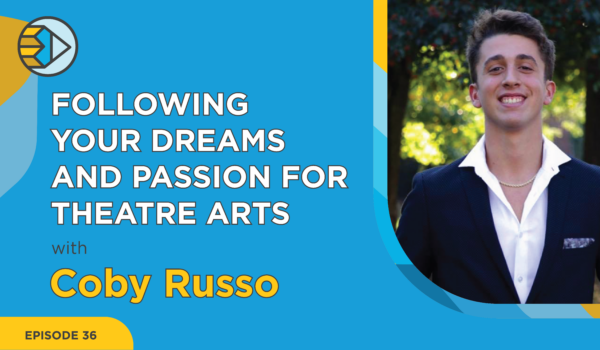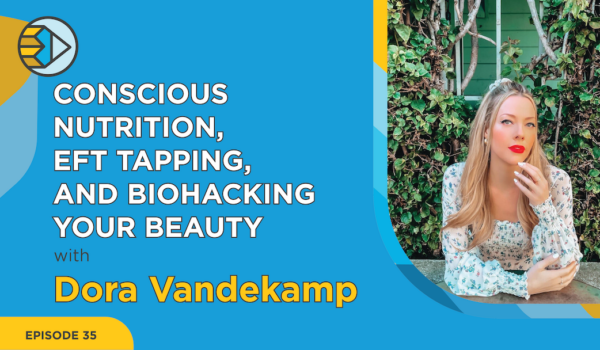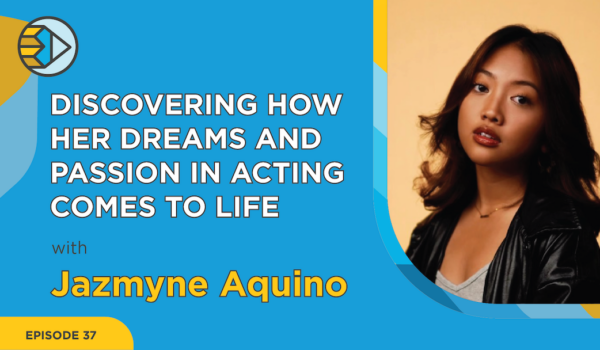
International Student Life, Study Abroad Advice, and More From Egle Jakuciunaite
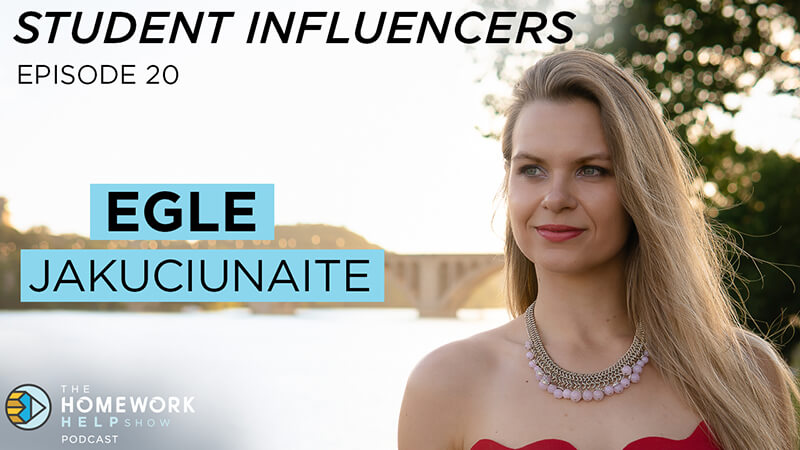
As an international student, Egle Jakuciunaite had a lot of challenges to overcome. On Episode 20 of the Homework Help Show Student Influencers Podcast, she was gracious enough to share her inspiring story with us.
Egle was born in Vilnius, Lithuania, and came to George Washington University in Washington, D.C., on a tennis scholarship to study international affairs and economics. After graduating, Eagle stayed in the United States on a work permit and now lives in Northern Virginia just outside D.C.
During our chat, Egle shared a ton of great advice that stems from her journey studying abroad in the United States and learning to adjust to an entirely different culture, both academically and professionally. As a senior associate, she has an inside perspective on the hiring process and had some great job hunting tips to share as well. In other words, if you’re graduating soon and looking to find a career job, you’ll want to take her advice.
Read the highlights from Egle’s interview on the Homework Help Show Student Influencers Podcast to learn about her life as an international student, her tips for finding a job after graduation, and so much more.
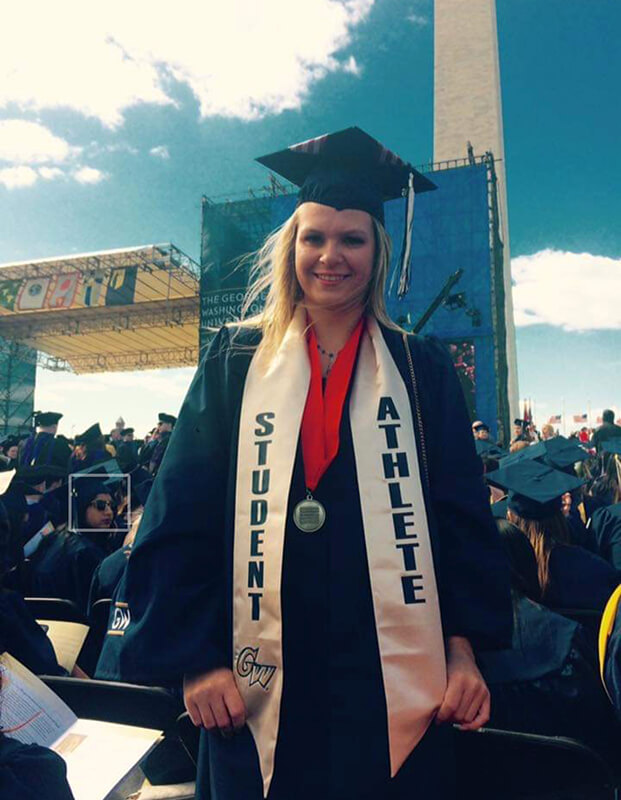
Egle’s Story
As we mentioned before, Egle was born in the small Eastern European country of Lithuania, in its capital city, Vilnius. She moved to the United States in 2012 to attend George Washington University in downtown Washington, D.C. for her bachelor’s degree.
Egle was always interested in the social sciences, particularly regarding diplomatic relationships and international affairs. Her original goal was to work in diplomatic relations with the Lithuanian government, to work for a non-governmental organization (NGO), or to work in consulting. After graduating, Egle got a job in consulting at a global firm and decided to stay in the United States.
In addition to her career goals, Egle also has a passion for travelling, tennis, and staying well-balanced in an ever-changing world. She goes home to Lithuania at least once a year, usually at Christmas, and brings her mom over to go on travel adventures from time to time.
These days, Egle focuses on her career as well as her passion for travelling. She shares her travel inspiration and tips on her Instagram page, @Lithuanianworldwide, and is working on building a website to share more travel content. Her current plan includes building out a travel blog where she can share her experiences, itineraries, travel guides, photos, and more.
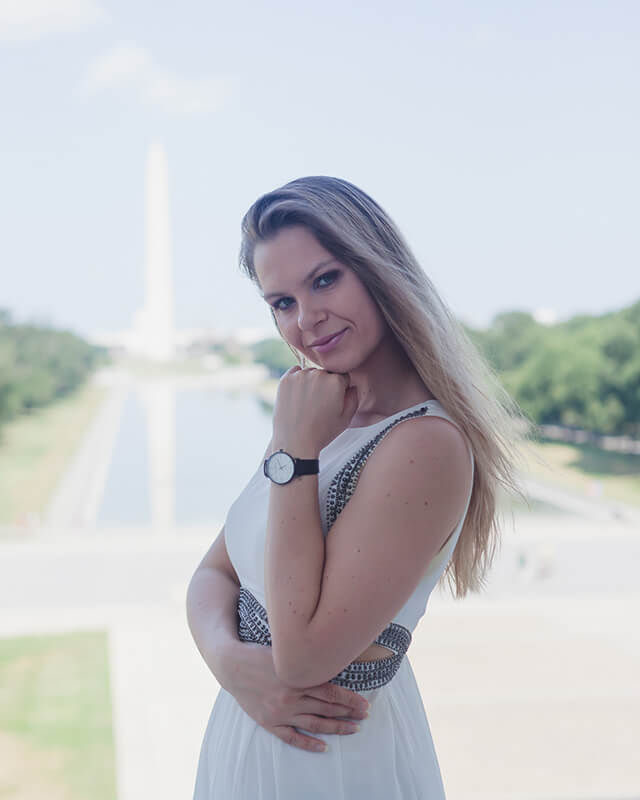
Small Fish in a Big Pond: Adjusting to Life as an International Student
Making the jump from a small European country to the hub of political affairs in the United States is never easy, and for Egle, there were some initial challenges.
The first hurdle for Egle was dealing with homesickness. All of her family and friends were back home, and she wasn’t used to being so far away from them for a long period of time. “I was extremely homesick and I felt like I was crying almost every week,” she says.
Egle’s next hurdle was something most international students have to face: the language barrier. All through high school, she’d studied in Lithuanian, her native language, but had to quickly switch to English once she started university. While she did have a little bit of basic English taught to her, it was tricky to try to keep up with how fast her professors were speaking and how many English-language books she had to read.
Now, she only uses Lithuanian to speak to her parents back home and has a big circle of English-speaking friends that she communicates with regularly. She also has to use English for work, so she’s gotten the hang of it over the last eight years.
Another hurdle was dealing with the different culture. Back home, Egle says, “We’re kind of raised in the way that you shouldn’t talk to strangers and it’s weird if people just come up to you and start talking.” However, in the United States, people are much more comfortable approaching strangers and striking up a conversation, so this was something she had to learn to get used to. Now, when she does go home, people tell her that she talks too much or gets too close to strangers and she has to continuously flip a switch between cultures.
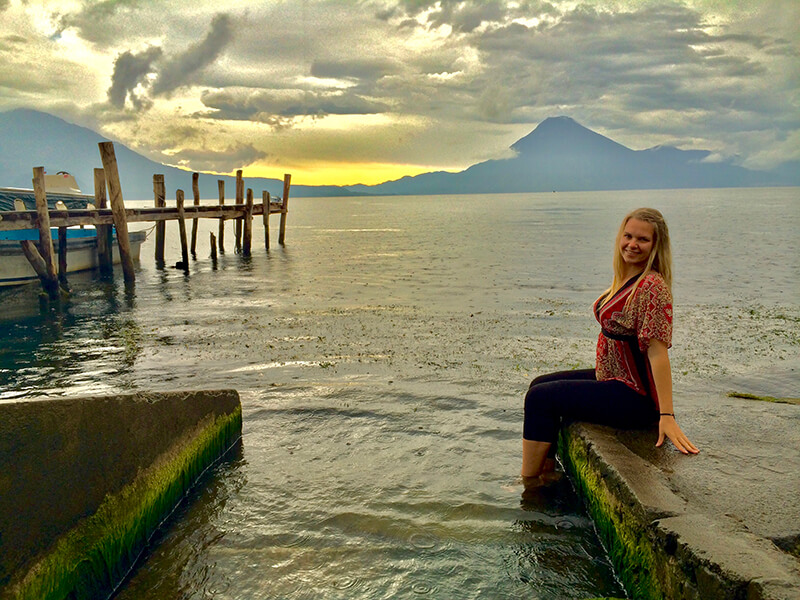
Egle’s Tips For International Students
Now that she’s been in the United States for eight years, Egle has a pretty good grasp on what it takes to adjust to an entirely new culture and lifestyle. So, who better to give a little bit of advice to those students who are just entering this process for the first time?
Here’s what international students need to know, according to Egle:
● Build yourself a support network. Don’t be afraid to reach out for support within your inner circle. Whether that’s reaching out to connect with an ESL tutor or just asking classmates to practice with you, people will always be willing to help you learn.
● Keep practicing. It takes a lot of practice to learn about a new language and adjust to a new culture, but it’s definitely worth it in the end.
● Stay focused. Learning a new language is tough, and will require focus and dedication. When you’re practicing English, put your phone away and keep your schedule on track.
Even if you don’t have the opportunity to be an international student or study abroad, there are so many ways you can take in new cultures and travel in college.
Egle spent plenty of time volunteering abroad during university. Her school had a student volunteer organization that planned six week trips for teaching and entrepreneurial development. First, she spent six weeks in Istanbul, Turkey, volunteering at a high school summer camp where she helped the students with English communication.
For her second volunteering abroad program, she went off to Mauritius, a beautiful island country off the coast of Africa, working with female entrepreneurs and women-led startup companies. She and her group helped the women market their products, got them set up with websites, and helped them connect with producers to profit from their creations.

Always Embrace the Adventure
Going abroad for any reason, whether it’s studying as an international student, volunteering, or even just for recreational purposes, can be intimidating. When it comes down to it, however, Egle’s advice is this: “If you can go abroad, just do it.”
There are so many benefits and advantages to spending time overseas. You can make strong friendships, like Egle did, and learn so much about the different cultures around the world. For her volunteering experience, Egle purposely chose Istanbul and Mauritius because of their diverse and unique cultural learning opportunities. In Istanbul, she could learn about both Middle Eastern and European cultures, while in Mauritius she got a combination of Indian, African, and French cultures to learn about.
Want to hear more stories about studying abroad that will motivate you to hop on a plane as soon as it’s safe? Check out Episode 17 of the Student Influencers Podcast, where Tynika Thornton shared her own story about fitting in, making friends, and learning about new cultures.
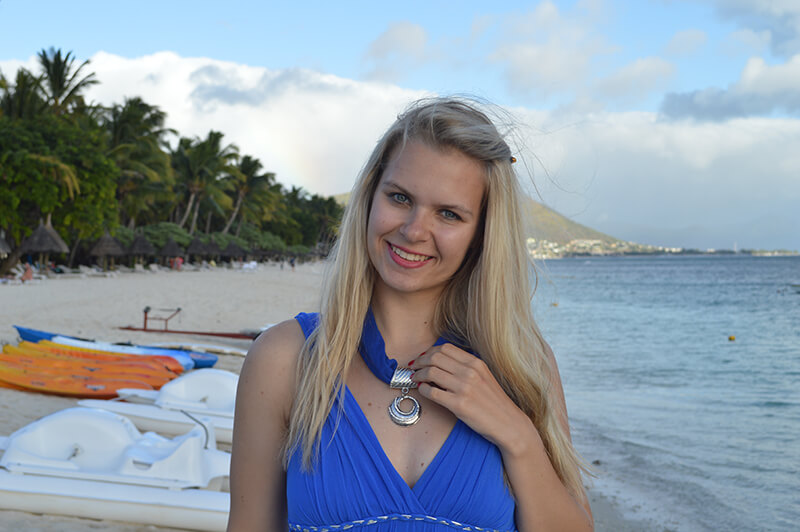
Applying For International Scholarships
When you sign up to become an international student, the reality is that it isn’t exactly cheap to study abroad and there are a lot of costs involved.
Egle was able to come to George Washington University for her undergraduate program because she received an international scholarship for tennis. She has been playing tennis since she was nine years old, and it’s always been one of her biggest passions, so to be able to play NCAA tennis in university was a dream come true for her.
If you’re thinking about overseas education, many schools offer scholarships for international students. You’ll still need to work on obtaining a student visa, but it’s worth it to do your research and see which scholarships you qualify for to take some of the financial load off your shoulders.
You can find scholarship opportunities by inquiring with the school you’re planning to attend or checking out their website for resources. There are also some websites that provide resources, such as InternationalStudent.com and ScholarshipPortal.com.
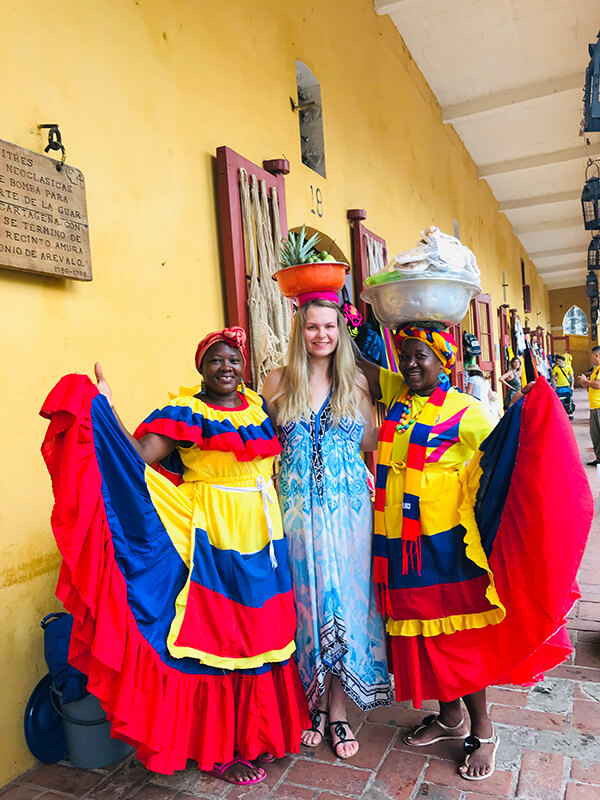
Work Hard For What You Want
Coming in on an international scholarship to play a NCAA sport takes a lot of hard work and dedication. Egle says she practiced for about 20 hours a week, or three and a half hours a day, with one day off. On the weekends, the team would travel for matches. “It was nearly the commitment of a full time job,” she says.
So, how exactly did Egle manage to fulfill her commitment to the tennis team and complete her studies? As it turns out, it took a lot of trial and error. In her freshman years, she became easily overwhelmed trying to balance everything, but she learned how to adapt.
Her biggest piece of advice is to maximize all of the study time you can get. Whether it was reading a chapter on the bus on the way to a game or flipping through her notes during a lunch break, she always found time to fit in some studying.
She also says she had to learn to stay organized and focus on one thing at a time. Don’t try to jump around and fit everything in at once, because you won’t be able to focus your attention on one particular thing.
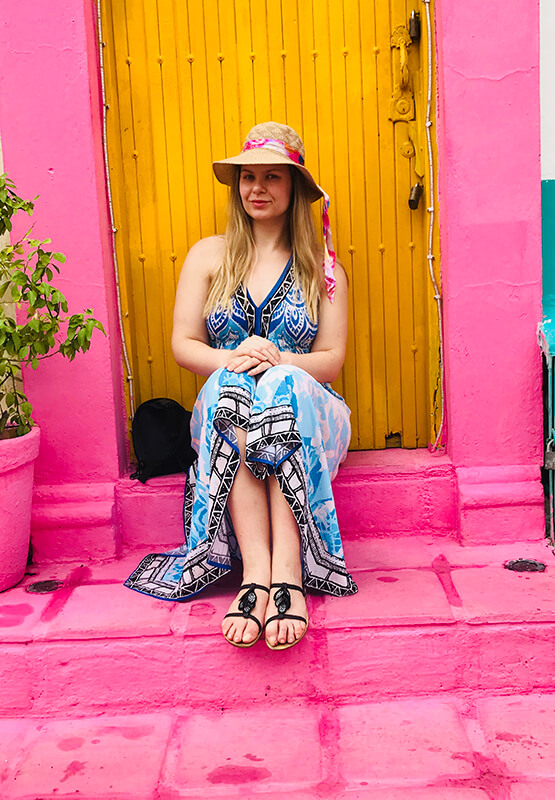
Set Measurable and Achievable Goals
What’s the key to good time management? Realistic goals.
“Instead of just thinking to yourself, let me try to get an A in this class, I think it should be more focused on the steps, how you can get there,” Egle says. “Whether it’s a weekly plan or day by day plan, it’s just having those little goals in mind that would eventually get you to the bigger goal in the end.”
Follow the SMART goal setting technique. Set goals that are realistic and achievable, and break them down into steps you can accomplish that will help you reach that bigger picture. For example, if you’re trying to finish a big term paper, try breaking it down into chunks. One session can be for writing the outline, while the next can be for your introduction, and so on. This way, you feel more accomplished and confident as you work to complete your goal. It’ll help you stay focused on the finish line as well.
For more tips on setting good goals and maximizing your own study time, check out our ultimate study guide, where we go over some great tactics you can use.
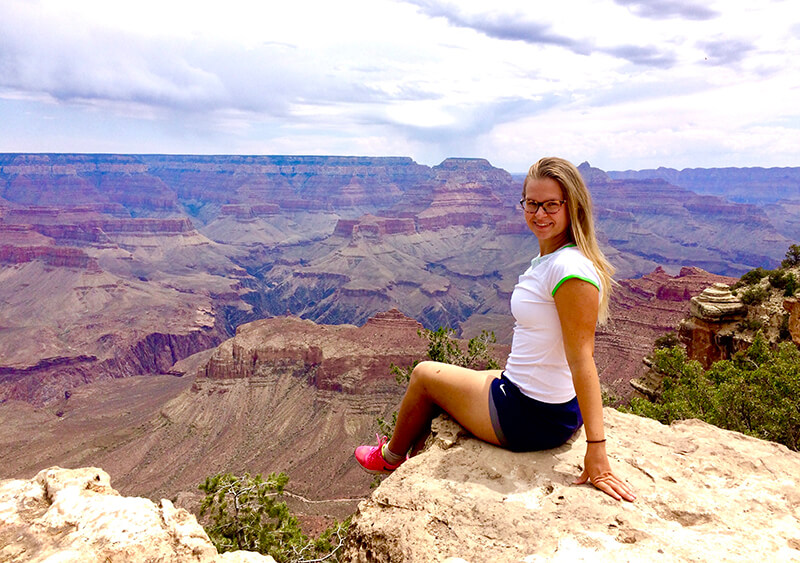
Egle’s Tips For Getting a Job After College
Egle was lucky enough to find a career in her field relatively quickly after graduating. However, many students aren’t that lucky and sometimes it takes years to break into an entry-level job in your chosen field.
Here is some of Egle’s advice for students working on finding a job after graduating and setting yourself apart in the job hunt:
● Set yourself apart. Whether you get an A+ or an A- doesn’t really make a huge difference in the long run, but what does is the way you develop as a person during your time in school. Personality matters, and sometimes you can get further by being more well-rounded and having diverse life experiences than simply getting high marks in school.
● Be persistent. Good things don’t come easily, and it takes work and dedication to make them happen. You may need to send out dozens of applications before you get noticed, but don’t give up.
● Start looking early in the year. Many companies have different recruiting cycles throughout the year and you can take advantage of this by applying early on, while you’re still in your last year of university. Try looking for jobs in the fall or winter of your last year. The earlier you start, the more openings there will be.
Need a little extra help with your resume? Try using a professional resume writing service to help you out. This will give you that extra chance to get your foot in the door and reach that next step in the hiring process.
The Extra Challenges of Finding a Job as an International Applicant
As an international student at an American university, Egle had to deal with a few challenges when finding a job after graduating. On top of trying to find ways to stand out in a crowded sea of applicants, Egle also had to deal with the international barrier and getting a work visa to stay in the country.
Work visas come with a set of limitations, and hiring companies have to pay for them. That means a lot of extra expenses that come with hiring an international applicant instead of an American citizen. As a result, some companies are hesitant to pay for that.
So, how do you get a work visa? For Egle, the process was about putting herself out there and proving her worth. She spent a lot of time and effort putting in applications, networking within her field, and going to career fairs to meet people.
Another advantage Egle had was that she did an internship with her current company after her junior year of school, and was hired on full time after graduation. Through her internship, her company saw the value she could provide, and was therefore willing to sponsor a work visa for her. When you’re doing a study abroad program and want to stay in that country, try to get an internship instead of a random summer job. Even if it’s an unpaid internship, you’ll be able to get valuable experience that will help you get hired later on – maybe even by that same company.
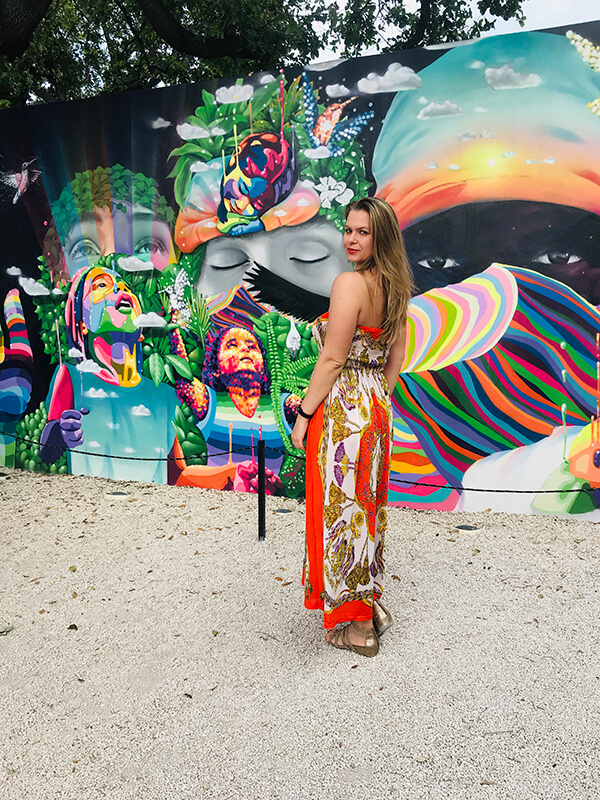
Listen to Egle’s Full Interview on The Homework Help Show Student Influencers Podcast
So where is Egle off to next and what’s her favourite memory from her time in school? Whether you’re an international student yourself or just looking for some motivation, you’ll want to tune in to Egle’s full interview on the Homework Help Show Student Influencers Podcast. She shared so many insights on travelling, motivating yourself to work hard, and adjusting to new experiences.
Listen to the full interview here on Anchor, or stream it on your favourite podcast service. We’re available on Spotify, Apple Podcasts, Breaker, Overcast, Google Podcasts, Castbox, and more. If you prefer a visual experience, tune in to the video on The Homework Help Show YouTube channel.
Don’t forget to follow along with Egle’s adventures on her Instagram page, and check out all of our previous student influencer interviews on our podcast page. We’ve spoken with so many amazing people and everyone has an inspiring story to share.
FULL TRANSCRIPT FROM OUR PODCAST INTERVIEW WITH EGLE JAKUCIUNAITE BELOW
Egle [00:00:02] If you want to reach a certain level of your better self, you need to put an effort.
Egle [00:00:09] Because nothing just comes out of nowhere. Maybe sometimes if people get lucky, but in most cases, it takes a lot of work and people don’t always see all the hard work behind.
Lesley [00:00:25] I’m your host, Lesley and today, I am here at the Egle. How are you today?
Egle [00:00:31] Hi, Lesley. I’m good. How about yourself?
Lesley [00:00:34] Great. Usually we get to get started, we do a few kind of initial get to know you questions. So where are you currently living?
Egle [00:00:46] So I’m currently just outside Washington, D.C., in Northern Virginia. I’m about five minutes away from the city. It’s a suburban residential area, but I’m very close to the city. So that’s the awesome part.
Lesley [00:00:59] Yeah, it seems like it’s kind of like a best of both worlds. Yeah. Perfect. And where were you born?
Egle [00:01:08] So I was born in Vilnius, the capital city of Lithuania, a small Eastern European country, and I moved to the US in 2012.
Lesley [00:01:18] Perfect. And what university did you go to?
Egle [00:01:21] I went to the George Washington University in downtown D.C. and I studied international affairs and economics for my bachelors degree.
Lesley [00:01:30] Awesome. And what made you decide to choose that for your major? Was that something that you kind of always wanted to get into or did it kind of come up later on?
Egle [00:01:41] Yes, I feel like in high school I was always interested in diplomatic relationships, history, geography, all those social science subjects. And I wanted to work either in diplomatic relationships for the embassy for the Ministry of Lithuania, or I wanted to work for an NGO or wo- or go into consulting. So I’m currently in one of those areas. So it worked out pretty well.
Lesley [00:02:09] It’s always- it’s always good when things work out like that the way you want them to.
Egle [00:02:13] Yeah.
Lesley [00:02:15] So you came here to the United States for school? Correct?
Egle [00:02:20] Yes, that’s correct.
Lesley [00:02:22] So what was it like to come here and kind of transition to that? I’m assuming there was a pretty big difference coming from a small European country to the United States.
Egle [00:02:33] Yeah, it felt very different and it was actually much harder than I expected it to be. I was very homesick because I’ve never been away from home for more than a month. All my family, all my friends, they were back home. So I was extremely homesick and I felt like I was crying almost every week and I also felt it was a little bit hard to go to school in English because I studied through my high school in my native language, Lithuanian.
Egle [00:03:06] That was also a little bit hard, especially with some classes when professors were talking quickly or reading the books. And there were some words that I didn’t understand. That was the language barrier as well. And from a cultural perspective, I thought the people here were also pretty different. They’re much more open and much more talkative. Whenever people would come up to me in.. on the streets or in the bus and they would just start talking to me, I found it very uncomfortable because back home, we’re kind of raised in the way that you shouldn’t talk to strangers and it’s weird if people just come up to you and start talking. So I feel like there was also this part that I was a little confused at the beginning. But now, you know, it’s been eight years. So I’m very well used to the culture here.
Lesley [00:04:02] Is it kind of weird if you go home and you have to kind of stop yourself from talking to strangers?
Egle [00:04:07] Yeah, I feel like whenever I go back home, people say that I’m like too talkative, too… I come up to people too much.
Egle [00:04:16] So now it’s I guess, you know, the other way around.
Lesley [00:04:19] You kind of have to flip a switch back and forth, I guess.
Egle [00:04:23] Yeah, I do. And even when it comes to language, because it’s like now I work in English and obviously all my friends here speak English. So I only speak my language to my parents nowadays. And it’s again, the same thing when I go back home. Sometimes I feel like I started translating from English to Lithuanian, even though Lithuanian is my native language, so.
Lesley [00:04:45] Right.
Lesley [00:04:47] Yeah. Did you kind of have to start learning English while you were also like jumping right into school or did you know a little bit of English as kind of like a base before you came here?
Egle [00:04:57] Yeah. So back home, people definitely started learning English in the second grade. So I was learning since I was a kid and I’d be like, if you go to a good school and you put in work or learning the language, you can get more or less fluent with it. I still had to take the S.A.T. and all these exams, so I was able to get a decent score. But yeah, I was still definitely much harder to be in- in the US.
Lesley [00:05:25] Right, where you have to use it all the time.
Egle [00:05:28] Exactly. And you have to write papers and communicate your presentations in classes. So yeah, that was hard, especially in the first year.
Lesley [00:05:37] Were there any kind of like techniques or little things you kind of learned along the way to kind of help you as you adjusted to this really big cultural difference and language difference when you got here?
Egle [00:05:51] Yeah. So I feel like one of the things that helped me a lot is just finding help in my circle and whether it’s the help from my classmates or professors or tutors or whether it’s just my other friends from abroad is just kind of always having this support network or academical, an emotional perspective. And also, I would say just staying focused. And once you have your schedule trying to not deviate from that, whether it means, you know, skipping a meeting with friends or putting phone away and not checking social media while you’re in the library instead of staying on track and being focused.
Lesley [00:06:34] So it’s kind of like the advice you would give if someone for some students who might be listening to this right now and who are thinking of either moving to another country, start to study or even just doing a semester abroad, is that kind of something that you would say that you would say for advice to them?
Egle [00:06:54] Yes, I would say that in general, if you can go abroad, just do it. It’s the best experience, at least for me. And whether it’s for traveling recreationally or for studying, I think it’s always worth it.
Egle [00:07:08] Just because you don’t only learn in classes, you also learn a lot from meeting people, knowing their culture, their different act to food and all of that. So personally. Yeah, I feel like to me, coming to the US was definitely huge and developing myself. And I’ve done a few other volunteering programs abroad and both of those were also great experiences. I feel like it kind of helped me to be who I am today.
Lesley [00:07:41] What kind of volunteer work did you do abroad?
Egle [00:07:44] So I did do volunteering programs with ISEC, which is the student organization, and they have six week programs mainly for teaching and entrepreneurial development. So my first program was in Turkey, Istanbul. I was there for six weeks working at a high school summer camp. So we were helping students, not directly teaching English, but more just helping them to learn how to present in English, make… make songs or just make a play, just getting them comfortable with speaking English, basically. And then in my second internship, I spent six weeks in the Mauritius, the tiny paradise island near Africa. And we were working there with the women entrepreneurs startups. So they had different type of products, whether it was clothing or jewelry or some other type of handicrafts. But they needed help to kind of start off and get into the market. So we weren’t helping them primarily with marketing, building websites, finding distributors for their products and all of that. But both of these experiences, they were not only fun for the work we did, both for the people we met, because some of my closest friends, even nowadays, are from these two programs. So, I mean, to sum up, if you can go abroad, you should go abroad.
Lesley [00:09:17] Yeah, it sounds fascinating.
Egle [00:09:20] Yeah.
Lesley [00:09:20] And going to all these different places like those are obviously some very different locations. So I’m assuming there’s a lot of new things to learn there and a lot of different experiences to have there.
Egle [00:09:32] Yeah, exactly. And that’s why I was trying to pick these different locations that are, you know, farther away from home and farther from the U.S.. So in Turkey, I could experience a little bit of Middle Eastern culture, along with some European, since a sample is divided between the two continents and then more ratio’s. It was like a little bit of Indian culture mixed with some African and French. So all of that cultural mix. And it’s so diverse. Yeah. If you can do it. It’s great. Yeah. And I was really happy with the way that iSEC organization run these programs. I highly recommend to check it out.
Lesley [00:10:14] Amazing. That’s definitely sounds like an amazing experience. You mentioned to me before that one of your biggest passions was tennis and that when you came to the U.S., you played NC Double A Division one tennis and you played that when you were in university.
Egle [00:10:35] Yes. So I played tennis for my schools throughout four years and this is actually one of the ways that I came to the U.S. and why I wanted to come to the U.S., because it has very well developed sports programs and scholarships for athletes as well. So, in my case. I mean, I come from an small eastern European country. Salaries aren’t the highest back there, so, unless I have a scholarship for tennis, I would not have been able to be in the US. And I was playing tennis since I was nine years old, so it was my big passion. I wanted to be a professional player, which didn’t work. But still being college athletes in the US was my second goal. And that worked out for four years. Yeah.
Lesley [00:11:25] Yeah. That’s a pretty big… That’s still a pretty big accomplishment. Is that it? Is tennis a pretty big sport back home?
Egle [00:11:33] It’s not. We have one player that has made it to the top hundred in the world. So he’s the only one that is kind of driving the passion.. the passion for sport. But overall, back home, it’s mostly basketball. We have a pretty good team. Yeah. So it’s basketball. But some people play tennis. I got into tennis because my mom was playing when she was young. So she just brought me into the tennis practice as a nine year old girl. And from there, I loved it. That’s all I wanted to do. So, yeah, that’s what I did. Basically, I still play sometimes now.
Lesley [00:12:14] That really at that worked out for you anyway, because that got you also helped you achieve those goals. But NC double A sports are obviously very competitive and time consuming and demanding. And there’s a lot of training involved. I would assume.
Egle [00:12:31] Yes, so for tennis, we would practice up to 20 hours a week with having one day off. So dividing that… it happens to be about three, three and a half hours per day, which is pretty hard, as you can probably imagine. So our practice used to be in the mornings from eight a.m. till eleven thirty. So we also had a very early start to have breakfast with the team and then get going. Have a warm up, so… Yeah, we would practice like that and then we would usually travel for the matches over the weekend. So travel time in the van was not included within the 20 hours. So as you can imagine, it was nearly the commitment of a full time job.
Lesley [00:13:23] Right.
Egle [00:13:24] So, yeah, it was definitely not an easy thing.
Lesley [00:13:28] No. How did you kind of keep up? Because also taking a program like the… Like your program that you took requires I’m assuming that also requires a lot of work and studying because it’s very obviously it’s economics and things that. A lot of kind of time consuming things. So how did you kind of balance all of those things? Like, it seems like a lot that you had to balance.
Egle [00:13:54] Yeah. It was really alot then. I felt overwhelmed, especially at the beginning when I just started as a freshman. I think that one of the things I learn is just maximizing the time to study whenever you can. Whether it’s reading a chapter on the bus or in the car or if you have, I don’t know, 30 minute lunch break, you can still read something or send a couple e-mails. So it was a lot of just taking little bits here and there. And then, like I mentioned before, I would say just staying focused and having a schedule. So I know for some people they may not like going to the library. I personally did because I felt it was easier for me to just be in the cubicle focused on what I have to do. But I think it’s definitely better for everyone to find their own way to focus, whether it’s at home, in the cafe or so. And just when I say staying focused, I feel like just focusing one thing at a time instead of trying to jump around different and chat with people, because that kind of distracts you. So yeah. I was very organized.
Lesley [00:15:07] Yeah, it sounds like it… Is it kind of like.. Was that kind of like your time management secret, almost like if someone were to ask you for advice, would that be like the biggest thing you would say would be just stay organized and stay focused?
Egle [00:15:23] Yeah, that’s what I would say is just setting up your schedule with the time management. If you pick certain time to do this class homework, certain time to prepare for this exam, just make sure that you stick to it with and be determined and not go left and right.
Egle [00:15:40] I think it’s very important and it’s also important to have goals that are kind of measurable and achievable. So instead of just thinking to yourself, let me try to get an A in this class, I think it should be more focused on the steps, how you can get there. So it’s more… Whether it’s a weekly plan or day by day plan, is just having those little goals in mind that would eventually get you to the bigger goal in the end.
Lesley [00:16:08] Yeah, that kind of kind of goes along with the whole idea of the smart goal setting.
Lesley [00:16:13] So it’s Iike..
Egle [00:16:14] Yeah, we were taught a lot about those. Yeah.
Lesley [00:16:16] Yeah. So it’s like set the reasonable goals and give yourself like a specific goal and something that’s reasonable and within a certain kind of time limit so that you know exactly how to get to that goal and then it’s something you can do.
Egle [00:16:33] Exactly. Yeah. The smart goals was what they were teaching us for the Student Leadership Academy a lot. And that applies both for sports or school or in the career going forward.
Lesley [00:16:47] Yeah, I took… I learned about smart goals when I was taking marketing, but I think that it applies to literally every industry possible.
Egle [00:16:56] I agree, definitely.
Lesley [00:16:57] Definitely. And I know another thing that you it’s one of your other big passions is traveling. And I know we’ve already even talked about some of the different places that you’ve traveled to for internships and things like that. But we also just talked about how busy you are as a student. So is traveling kind of something that you were able to fit in when you were a student, or was it kind of just like later on or?
Egle [00:17:29] Yes, I think traveling as a student during the school year was only for tennis tournaments because we have games usually locally every weekend or at least every other weekend. So we would just drive with a team in the minivan, which wasn’t really like a fun trip. Yeah. But we also had a few bigger trips also with the team for spring break.
Egle [00:17:55] We did have games, but we also had time to relax. We’ve been to Florida, we’ve been to San Francisco, New York. So those places were more fun because we got to do some exploring around in addition to playing tennis. But yeah, besides those tennis trips and then the volunteering abroad, that was during the summer since I couldn’t take time off with this full year. Those were mainly the only trips that I did. And it started… And that’s how I started getting into traveling. So Turkey and Latricia’s volunteering programs where my first bigger exploring trips abroad and I just got hooked. And from then on, I travel every year, new countries, new places. And there’s just so much to explore. So that’s definitely one of my goals.
Lesley [00:18:49] Yeah, definitely. Do you get home a lot to see your family back home as well in between all of that?
Egle [00:18:54] So I usually go home for Christmas because luckily my current company gives about a 10 day Christmas shut down for.. for all employees. So we don’t even have to take her on vacation for that. So I go home for those 10 days. I usually extended to make it two-three weeks and work remotely since we are pretty flexible with remote work as well. So winter time is the one time that I go every year and no exceptions. But then I sometimes also have my mom come here in the summer time and I’ve taken her on a few of those trips as well. So she caught a travel bug from me and now she’s looking forward to traveling again.
Lesley [00:19:41] And that must be really nice for her to getting to kind of go. And then now you have an inside scoop to take her to places and like kind of show her, because it’s probably a new culture for her too right, because you moved here by yourself, so.
Egle [00:19:57] Yeah, that’s correct. I did. And I think for my mom and my dad as well, they mainly travel around Europe. So our country was previously a part of the Soviet Union as well. So they’ve done a lot of trips around the current Russia. They haven’t been as much outside of Europe. Before my mom going to countries with me like Peru, Columbia, Puerto Rico. It was a completely new world, which is a new world to me, too, obviously. And yeah, I, I always say that traveling is one of the best things you can do and yeah.
Lesley [00:20:33] I agree. I always forget to because we’re.. Like I’m in Canada. And I always forget that how easy it is when you live in Europe to just like travel to different countries all within Europe, because, like, I’m so used to being in Canada and it’s so… It takes a day just to drive to the other end of the province. So I always forget how easy that is. Yeah.
Egle [00:20:55] Yeah. But there’s.. I feel like in big countries like Canada or the US, there’s also so much to see with them. The country was all the nature and national parks. Yeah. Yeah. To make it to Canada to the Banff National Park.
Lesley [00:21:10] Yeah, Banff. Yeah.
Egle [00:21:12] Yeah. That’s one of my bucket list places.
Lesley [00:21:15] Yeah, Banff is- is beautiful. Especially if you go there right at- at like those changing seasons. Like if you go there towards the end of the summer and beginning of fall, they’re super… It’s, it’s beautiful out there. So, yeah, you’re right. Like it… It’s bigger. It takes- it’s harder to kind of get to one place or another. But there is a lot of really awesome things to see too. So that is an appendage. But same with Europe. I mean, every country in Europe is completely different.
Egle [00:21:43] Yeah, I think that’s a good and easy part about being in Europe. But I’d be like, surprisingly, I haven’t traveled as much in Europe just because well, I have traveled around Europe, but that was also for tennis tournaments when I was playing juniors. And I feel like whenever you travel for a sports competition, you’re mostly involved in that with all the training’s warm ups, relaxing, stretching. So I haven’t had a whole lot of chances to explore the places. But yeah, I’ve been to quite a few countries around Europe for tennis as well.
Lesley [00:22:20] Yeah, that’s true because if you’re traveling for a specific like for especially for sports, because you’re so… You have to- the sports come with so much like preparation and warm ups and stretching and all the extra stuff, there’s not really a lot of time in there to kind of just y’know.. The whole day, so.
Egle [00:22:37] Exactly. We would sometimes have like half a day or two, three hours to go walk around the town or go see the mountains and Switzerland, but that was about it. So it still gave a little glimpse of each country and culture, but it was mostly playing sports, yeah.
Lesley [00:22:55] Yeah. Definitely. Probably use some more time. Obviously, there’s a lot of really awesome things that you’ve done. Being in school and traveling and all that. What would you say is your favorite memory from your time in school?
Egle [00:23:13] So I would say that from the time from those four entire years in school, my best memories would be those summers spent abroad, which is then directly the time from college. But still the four years count. Right. Right. And I always say my other favorite memory is all the different events that we had a chance to go to, whether it’s like, let’s say, athletics gala awards, whether it is difference on organization events, like I wouldn’t say that there was one particular one that stands out the most, but just the entire experience of being with people, meeting, going to places.
Egle [00:23:59] And like I said, different people obviously have different hobbies. But whether it’s music or dancing or any kind of other stuff, I think that was to me the highlight. And there’s a long list of events that would be top memories.
Lesley [00:24:15] Yeah, that’s one of the best things about- because we ask most of… Almost every one of our interviews, we ask that question because it’s really interesting to see, because obviously everybody is so different. Everyone always has these completely different stories. Some people it’s meeting friends and some people it’s, you know, a conference they went to or something like that. So it’s so interesting to see how everyone kind of takes that university experience and kind of their personality really shapes what they remember from it.
Egle [00:24:44] Yeah, I agree. And that’s one thing I feel like if I would go back to school, I feel like for some classes I wouldn’t study as hard as I did. Because once you graduate and you get into the job market, you realize that there are so many things you’re learning in school that aren’t necessarily directly helpful for your career.
Egle [00:25:08] So I feel like it’s, of course, important to get good grades to be successful later on. But sometimes, if you like, whether you get A+ or A-, that probably doesn’t necessarily make a huge difference. But it’s also important to develop yourself as a person which comes from all the people experiences within organizations, travel. And that is actually very handy. I feel like when it comes later on to the job searches, because personality matters a lot. Sometimes you can get farther away just by being well-rounded instead of being just nerdy and having no other interest in life.
Lesley [00:25:49] Yeah, definitely. Those… Those experiences really give you those, those other life skills that you get from the experience of going to university. And they really give you they help you kind of round out. So when you do apply for jobs, you really, really stand out because you have those unique experiences. And it’s not just. OK, well, here’s I have really good marks.
Egle [00:26:10] Yeah, exactly. I think it helps you stand out with whatever else you have done, different hobbies. So it’s definitely important to focus on that.
Lesley [00:26:20] Yeah, definitely. And I know we also talked about some of the challenges that you faced when you came here with the language barrier, with the culture barrier, balancing high demand sport with your studying. Were there any other kind of challenges or obstacles that you had to overcome when you’re in school?
Egle [00:26:45] I would say that one of the other obstacles that was kind of chasing me since junior year was that job hunting, because if I think it’s obviously an important part for everyone, but is especially hard for international students just because there are certain visa limitations and companies have to pay for a visa to hire you. And some of them, they don’t want those extra expenses.
Egle [00:27:14] So I feel like I was very stressed out about that because I knew I wanted to stay in the U.S. But I was also thinking, well, maybe I will not be able to find the right job. Maybe it’s because I’m not good enough, or maybe because I’m a foreigner. So that is something that I had to put quite a lot of effort and just applying, applying, networking with people, going to the career fairs. And I think all of that in the end it helps.
Lesley [00:27:44] And I could see that being something that’s really hard not to take personally. If there’s… With companies, maybe companies don’t really want to take that expense. They don’t really want to do all that extra work to hire someone who needs a visa. But I could see that being really, really difficult too, difficult for your kind of self-confidence and yet not taking that personally and taking that like, oh, I my I just must not be a good candidate or whatever.
Egle [00:28:15] Yeah, I agree. And I feel like in those cases, if there’s international students that are facing the same issues, I feel like it’s definitely important to be persistent. I know that nowadays this thing might be harder with the current government and everything, but at least before and hopefully in four years down the road or so, I feel like it would still be possible to get a good job in the U.S. It just takes a lot of effort. I know that for one of my best friends in college, it took her about 10 months of applying every week, at least five to 10 applications to get one offer. And it’s crazy when you think how many interviews and applications you sometimes have to go through. But I feel like that goes back just to being persistent with… You know, putting that effort for what you want, because if you really want something, whether it’s a good grade or whether it’s getting a job or starting a business, I feel like you really have to put the effort because good things, they typically don’t come easily, right?
Lesley [00:29:27] Exactly. Yes. You kind of got to take you awhile to get the job that you have now, I know you told me you’re a senior associate at a global accounting firm.
Egle [00:29:42] Yeah. So I work at PricewaterhouseCoopers. It’s been almost four years. And I was hired full time right after my graduation because I did an internship with them summer after my junior year. So was nice because it ended up being like a fast track. You do a successful internship and you get a full time offer after. So it did take me some applications to get the internship. I think I applied maybe twenty or thirty positions. So it’s not as many as some people go through, but it’s still not one of the first few shots, obviously. And that’s something that I think is very important. If there is any juniors or below listening to the podcast, just start looking into the market early, because especially with bigger companies, if you intern with them, whether you’re a sophomore or a junior, if you do well, they will likely give your full time offer to come back up through graduation. So I would say, if possible, try not to focus on just getting any random summer job for those years, especially after the junior year, which I think is critical, because, again, you may get a temporary job, whether it’s paid or unpaid. It’s still good to have experience. But if you are able to aim for a bigger fish, I think it’s worth it because again, in my case, I landed the job off her before even entering my senior year so that if takes off a lot of stress off your plate and…
Egle [00:31:26] If it’s possible, I think that is the best way to go.
Lesley [00:31:29] Yeah, definitely it seems like… I think that for a lot of industries, I think that’s probably like those securing those internships and even co-op positions. I think those are super important because, like you said, it can really help you get that foot in the door, especially with the job market in North America as a whole, with the job market being the way it is now and being very limited. And I mean, I know that we are still experiencing unique circumstances with the pandemic and that we had on me. But even before that, I know that at least here in Canada our… the job market was really… It’s really, really, really tough right now. Yeah. Especially for those recent graduates. It’s really, really hard to get your foot in the door so I feel like that’s a really big thing for students to remember, especially if you’re in your senior year, because it really has a big advantage.
Egle [00:32:32] Yeah. And I would also say that, again, whether you’re junior looking for an internship or a senior looking for a full time position. It’s always good to start early in the year because some people wait until spring semester and by then a lot of job openings are already closed. So I know from my company and other companies in the industry, they typically have several recruiting cycles through the year. One of which would- would start some applications would start in the fall. Some would be in the winter or some could be in the spring. So even though it’s… Or let’s say only September, October, you still have nine months to go. And you may not think that you need to start looking for a job. But if you want to have better chances and more positions open for you to choose from, then I would say starting from the fall semester right away.
Lesley [00:33:27] That’s something I’ve heard, too, is that for students who are… Maybe if you’re graduating saying the month of June that you’ve what you really need to do is you need to start looking for those job opportunities, like in December. Like in the winter, you said? That’s what I’ve heard. I mean, I could be wrong. But like in the winter months, that early for- for summer positions is…
Egle [00:33:55] Yeah. I would say. Yeah. Winter you can start. But like I said, I know people who start even earlier in the fall. And our company as well, they do some interviews in the fall that I was personally also helping. So I know that there’s a good number of interviews. So they usually do in the fall. Then in the spring again. But basically and again, I can speak from my company’s perspective. But I’m sure it applies for a lot of other companies. So let’s say we would have maybe 10 or positions every year and they would do the first round of interviews in the fall for these two positions. They may pick two people, but they might also pick eight or nine. Meaning that if you apply in the spring, you may only have one or two positions open. Right? Well, you you can really get ahead by doing it early, at least winter. But I would say even starting in the fall, because there’s definitely a good number of companies that are already recruiting for the summers.
Lesley [00:34:59] Wow. Well, thank you for sharing all of that, because I feel like that is really helpful. Kind of insider information that could really make a difference for someone who is listening right now, who maybe is starting their senior year and is kind of starting to think about that, because I wouldn’t I mean, I wouldn’t. I’ve been a student in a while, but I wouldn’t have known that.
Egle [00:35:21] So, yeah, I feel like yeah, in my case, I kind of learned about that after my senior year. Well, myself, I had the offer beforehand from the internship.
Egle [00:35:32] But knowing again, from my friends who started applying early and then from me being in the company, because we often help out with those recruiting events, going to the networking meeting with students. So I’ve done a lot of recruiting at my previous university, George Washington. So, yeah, we definitely go there in the fall and that’s not too early. Yeah.
Lesley [00:35:59] Yeah, definitely. I know that you kind of you already are in your career position and you’ve kind of you pretty on track with that. What are some of your current short and long term goals?
Egle [00:36:17] Do you mean from a career perspective or in general?
Lesley [00:36:20] I mean, and whatever you want to share, I mean, it could be both. It could be one or the other.
Egle [00:36:26] Yeah. So I would say from career perspective, I obviously want to advance and go forward. I’m currently a senior associate. So whether it is moving up the position or getting a master’s degree, there’s always room for improvement.
Egle [00:36:46] So those would be one of the goals. I’m not certain about the master’s degree yet because I feel like you can learn a lot on the job before going to grad school to pick the right program. So I’m not in the rush and I wouldn’t recommend for others graduating to be in a rush. And I would say that my other goals… More from a personal perspective are just fitness and overall healthy lifestyle, because when I graduated from college, I stopped playing tennis for like a year or two. And I was tired of it. So I didn’t want to exercise at all, which means that I gained weight. I didn’t feel good. So I feel like it’s important to not only focus on career, but also being healthy, which includes exercising, eating healthy food. That’s another goal that I have for myself, especially with pandemic. Given that we’re seeing home more, but it’s important to stay active, eat healthy. Just for a well-balanced life, because work is not everything, even though it is a big part of our life. And my other goal is also personal. But just coming from a passion for travel. I have started writing a travel blog. So I’m building my website where I want to share all the tips for traveling, recommendations, best places, best food, suggested itineraries for each destination. So that is something that is taking a lot of work because there’s a lot of trips, there’s a lot to tell. But this is my hobby and my true passion, I would say, at this point. So this is another thing that is hopefully coming later this year.
Lesley [00:38:34] That’s exciting. Is that something like you’re already you’re working on building your reps like it’s not up yet, but you’re.. You’re kind of working on it at like right now?
Egle [00:38:42] Yes. So I started during the pandemic as I find myself having more time, so I kind of already build the basics of the website. But now it takes most of my time to write all the stories, put all the pictures, make sure that I edit, give the right advice for travel. So I really enjoy traveling and sharing my photos, sharing my experiences, inspiring people to explore more. So both my website and my Instagram page are now under construction. Well, I already have my Instagram as a travel blog, but I’m working on the actual website.
Lesley [00:39:21] You’ll have to let us know when your website’s up and running. You’ll have to let us know. Send us a link so we can add it.
Egle [00:39:29] Yeah, definitely. I will do that.
Lesley [00:39:31] Do you want to share Instagram handle now?
Egle [00:39:34] Yes. Well, my Instagram handle is at lithuanianworldwide. No periods, no dashes, nothing. And it has my travel tips, travel photos from different places, primarily Latin America, but also other destinations. And I’m excited to do that. Excited to share. And I hope that people actually find those tips helpful and can travel to different.
Lesley [00:39:59] I’m sure they will. I mean, anytime I go somewhere, the first thing I check is people’s like personal blogs. Not necessarily like the TripAdvisor list or anything like that, because those are just like sponsored by corporate things. So I always look at people’s personal experiences and Instagram to get like the real kind of like the real scoop on where to go.
Egle [00:40:23] Yeah. And that’s what I want to create something that is helpful for people, that is pretty to see, but also good to read where you can go, what you can see the best restaurants. So I definitely hope that it comes helpful for many people going forward. Like I said, it is pretty new. My Instagram, I just established it as a travel warning back in January. There’s been a little less than half a year and then my blog is coming up. But I feel like there’s definitely a slowly growing community and I hope there’s more to come. Buying a camera, planning to get a drone. So that’s like a whole new world for me.
Lesley [00:41:04] Yeah, it’s definitely building a website or even a blog is not easy and not a lot of… It’s- sorry, it’s not easy and it is a lot of work.
Egle [00:41:17] Yeah. Exactly. It’s actually much more work than I expected it to be, starting from the technicalities of how you just build a website. That has been one tricky part, which I kind of figure it out by now, at least the basics. But now, when it comes to writing, I feel like if it comes to the, let’s say, writing about the best places in Miami, I have them in my mind. But then once you start writing, you feel like there’s so much to say. Now, just writing takes time.
Lesley [00:41:48] Yeah, absolutely. Definitely. Yeah, definitely. One of the questions we also always ask people, because it really gives us a lot of really kind of inspiring answers, is if you could go back to your fifteen year old self, what would you say or what would you kind of tell yourself?
Egle [00:42:11] I would probably tell myself that similarly, as I did, just continue working hard for what you want and don’t give up easily because sometimes people can tell you that, oh, there’s no way you’re going to get this wage. There’s no way you’re going to land this job offer. But I feel like it’s also just believing that you can do what you want to do, because unless you believe in yourself, no one else really would. But also together with believing in yourself, it’s about working towards your dreams. But like, if I were to go back when I was younger, I wish that I didn’t listen as much to all the negative thoughts of people saying that, you know, you won’t be able to get into college, you won’t be able to get a grades in school, which is what I was always aiming for, like for perfection, basically. So just. Yeah, I mean, ignoring those bad words and focusing on yourself and just continue moving forward every day, even if it’s just a little step, whether it’s just reading a couple pages from a textbook or writing half of an essay, I feel like it always counts. And these skills like moving forward little by little, they also transfer into life later on.
Lesley [00:43:35] Yeah, I think that’s absolutely true and super important to hear, especially since there’s always so much negativity going on in the world, especially right now. And there’s always going to be people who get in your head like that and really kind of get to you. So, yeah, like that’s really important to remember, especially when you’re 15 is a very impressionable age where words like that can really, really dig in there really deep.
Egle [00:44:05] Yeah, I agree, because I feel like when you’re young, there are so many things that affect you. And I feel like for me, let’s say when it comes to tennis, I may not have been the best player out there, but that didn’t mean that I cannot get a scholarship in the US. So I feel like I kind of needed my coach or my mom to keep reminding me that, you know, you can still do this. You can achieve it. It’s possible. So it’s just a lot about believing in what you can do and just working for it. But at the same time, I would also say if you’re a fifteen year old, you don’t stress out too much if something small doesn’t work. How? Because you are still young and there’s y’know, a lot of things ahead in life. So little things does not mean a failure, basically.
Lesley [00:44:57] Exactly. I think that’s that’s really important to hear too. One of the… So we always ask this kind of final question and it is… Do you have any favorite motivational quotes that you want to share?
Egle [00:45:13] Yes. The one of my favorite ones is, I would say dreams don’t work unless you do. And another one is the only way or the best way to get ahead is to get started. So, again, it’s not- not about procrastinating, just starting to move forward. And yeah, just like I said before, I feel like no matter whether it is school or work or hobbies, if you want to reach a certain level of your better self, you need to put in effort because nothing just comes out of nowhere. Maybe sometimes people get to like you. But in most cases, it takes a lot of work and people don’t always see all the hard work behind.
Lesley [00:46:00] I mean, even just thinking about, like, you know, the job, all the job applications and not giving up on that kind of job hunt, even then, that’s a great example. Just keep working hard for something because it’ll happen eventually.
Egle [00:46:19] Yeah, that’s exactly what I think is that it will happen eventually. It may take you a year to get somewhere that you want or 10 years or maybe one semester. But I feel like if you really, really keep chasing it, then at some point it should happen. And as I mentioned before, with school or work, it’s important to seek help. So if you feel like you’re stuck at a certain point and you just can’t figure out how to do better or how to learn something, there’s always different resources available out there. And I feel like it’s very important both in school and in the job market. Just being proactive, going out there, asking questions, seeking guidance from people that have been in your shoes before. So that personally helped me a lot, especially with my job just showing that, you know, you care. You’re curious. You want to learn. And that way people can help you figure out your way.
Lesley [00:47:21] Yeah, that’s great. I think that… I mean, all of this is really, really helpful, especially for those students. Like everything you shared today has been… I think important information that people may not really think about a lot when they’re entering their final year because they’re always excited like it’s our final year and then it’s like get to graduation. And you’re like, what do I do now? And you haven’t really… I don’t think…. I think sometimes people don’t think about that preparation aspect. So I think a lot of what you said today has is- really it’s really going to help people, I think.
Egle [00:47:57] I hope so. I’m always glad to help. Whether it comes to, you know, life or tennis or travel, I love talking to people or sharing my experiences. So if anyone wants to personally, talk with me and you can just reach me on Instagram at Lithuanianworldwide and I’d be happy to tell what anything you’re interested in.
Lesley [00:48:18] We will put your Instagram handle in the episode description as well so people can find you easier. Just before… Do you have any last final insights that you want to share? Just quickly, before we turn off or…?
Egle [00:48:32] I would just say what I just mentioned, that, you know, if there is anything that people want to talk to me personally about or check out the blog, ask about school tips or maybe get a referral in my company, which is a consulting firm, just feel free to reach out and I’m always happy to talk.
Lesley [00:48:53] Amazing. Well, we really, really appreciate you taking time out of your day to talk to us today and to share all this really helpful information. I think it’s been helpful.
Egle [00:49:03] My pleasure. Thank you for arranging this with me.
Lesley [00:49:06] It was nice to meet you as well.
Egle [00:49:09] OK, thank you. Well, I hope you have great rest of your day and stay healthy with these crazy time.
Lesley [00:49:15] You too. Stay safe. Definitely.
Egle [00:49:18] Bye bye.
Share:
